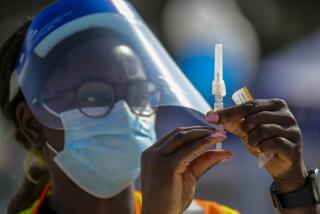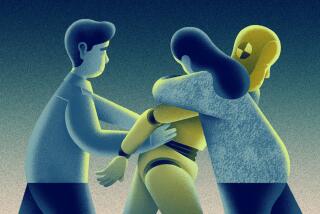Keep in Touch
- Share via
Somehow, somewhere, we lost a sense. I’m not talking about the common kind (although we are short of inventory in that department). We’ve lost touch with, well, touching.
But touch is worth paying attention to. Of the five senses, it’s the one designed to bond us with others. The very word itself, along with its thesauric cousins (“feeling,” “handle,” “contact”), refers to both a physical and emotional connection.
We leave our unique fingerprints when we use touch. And when we have no other senses to depend on, it gives our hands eyes. In fact, our whole body can read the Braille of life. After all, we’re wrapped in 6 to 10 pounds of skin, every centimeter of which is crawling with craving to be caressed.
Aaaah. Remember back in the movie-date days when two fingers could ski down the inside of your wrist, as if making tracks on virgin snow that whisked you to the edge of promise? When just the thought of copping a feel made your nerves curl and sputter like bacon in a pan?
For a journey into the erotic, we all need to go back there, says psychologist Mark Schwartz, clinical director at the Masters & Johnson Institute in St. Louis. When couples come to him for help with their sex lives, he tells them to go home and caress each other all over--breasts and genitals are off limits, no intercourse allowed.
“As you tease and play with each other,” Schwartz says, “it’s more like the dating when you couldn’t do anything but were driving each other nuts. So when you finally do get to the climax, you’re actually increasing the pleasure.”
Children deprived of physical affection also grow up to be more violent, says Tiffany Field, director of the Touch Research Institute at the University of Miami School of Medicine. For example, the U.S. is considered a “low touch” culture compared to “high touch” France (one study showed that in half an hour, French couples in cafes touched each other about 110 times while Americans clocked in at two), and Field says the violence in this country is much higher.
*
Touch can be a touchy subject. Fear of getting slapped with a lawsuit for giving someone a friendly hug has kept many at arm’s length. But researchers like Field say our institutional hands-off policy is not the answer.
“We mandate that teachers don’t touch the kids,” she notes. “Yet sexual abuse hasn’t gone away.”
Experts agree that we need to touch each other appropriately and with affection--and it needs to start at the very beginning. For starters, cradling a newborn is no less than vital to its development.
“If you don’t get touching neonatally, you switch over into a non-growing state,” says Dr. Saul Schanberg, professor of pharmacology and biological psychiatry at Duke University who found that rat pups deprived of their mother’s touch stopped growing, but would start again if researchers “licked” them with a paintbrush.
“For five or eight hours [not being touched] is not so bad; chronically, it’s bad,” he says.
Many studies have proven the importance of touch on human babies. One of the most famous, done more than a decade ago, showed that premature infants who were massaged 15 minutes three times a day for 10 days gained 47% more weight than a control group eating the same diet--and they were discharged six days earlier. Now take that 47, add a dollar sign, decimal point and a few zeros, and you’ve got $4.7 billion. That’s the amount we’d save in hospital costs today if every preemie were massaged, says Field, who did the original research.
*
Despite its woo-woo reputation among the medical community, science is proving touch to be a powerful healing tool for people of all ages.
One study recently commissioned by the federal Office of Alternative Medicine showed that massage combined with stress management counseling significantly reduced medical care use by people with moderately advanced HIV disease. Another study found that hysterectomy patients who were massaged post-surgery did not need to see a physician for the month after their release from the hospital, while a third of the control group did.
“Every other healing system in the world includes at least some form of massage and musculoskeletal manipulation,” says Dr. James Gordon, a clinical professor at Georgetown University School of Medicine and author of “Manifesto for a New Medicine” (Addison-Wesley, 1996), who believes rubdowns should be part of hospital protocol.
“Touch is medicine,” he says.
It’s also a ticket to staying well. In adults and children, massage has been shown to lower stress and anxiety while improving sleep and immune function. In one of Field’s studies, touch even seemed to boost brain power: Employees given 15-minute back rubs completed a math problem in about half the time with 50% fewer errors after the massage than before.
“I think massage should be right up there with diet and exercise,” Field says.
Adds Schwartz: “I like to think of applying the Zen concept of mindfulness to your caress. It’s like having a glass of wine. You can guzzle it, or you can slow down and maximize the experience”--and let that sense of touch do what it was designed to do.
(BEGIN TEXT OF INFOBOX / INFOGRAPHIC)
For More Information
For more information on touching, write to the Touch Research Institute, Department of Pediatrics, P.O. Box 016820 (D-820), Miami, FL 33101.


